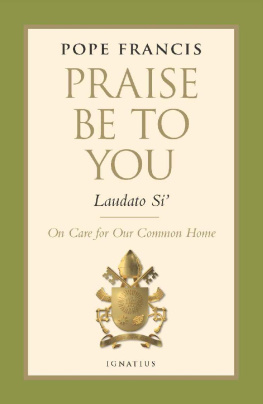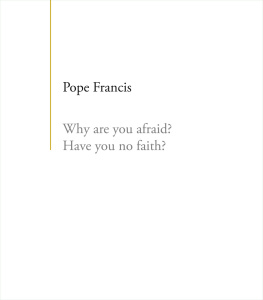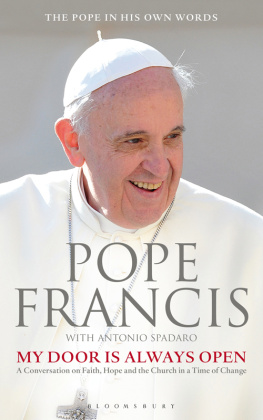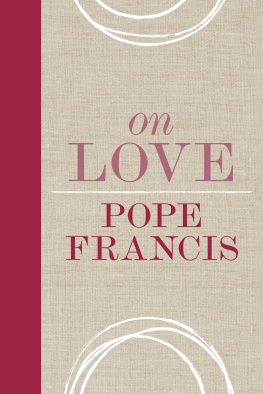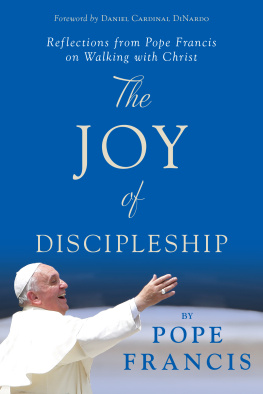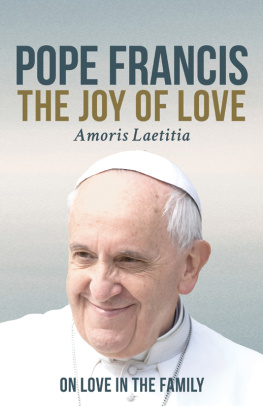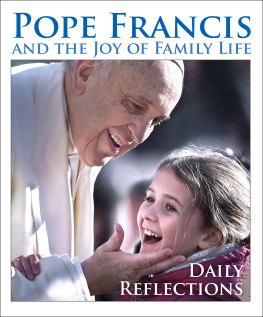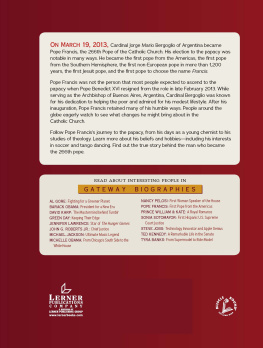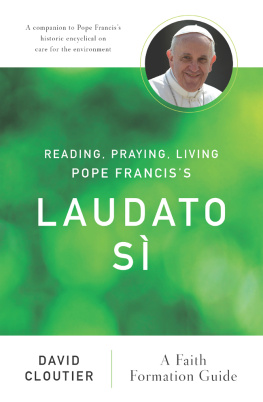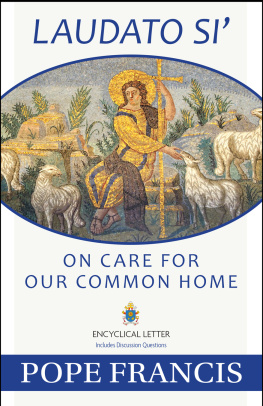PRAISE BE TO YOU
Laudato Si
ENCYCLICAL LETTER
PRAISE BE TO YOU
Laudato Si
On Care for Our Common Home
OF THE SUPREME PONTIFF
FRANCIS
TO THE BISHOPS PRIESTS AND DEACONS
MEN AND WOMEN RELIGIOUS THE LAY FAITHFUL
LIBRERIA EDITRICE VATICANA
IGNATIUS PRESS SAN FRANCISCO
Front cover art: Papal Coat of Arms of Pope Francis
AgnusImages.com
Back cover photograph of Pope Francis
Stefano Spaziani
Jacket design by Roxanne Mei Lum / John Herreid
Published in 2015 by Ignatius Press, San Francisco
Copyright 2015 Libreria Editrice Vaticana, Vatican City
All rights reserved
ISBN 978-1-62164-081-3 (HB)
ISBN 978-1-68149-667-2 (E)
Library of Congress Control Number 2015944415
Printed in the United States of America
CONTENTS
Nothing in this world is indifferent to us [3-6]
United by the same concern [7-9] Saint Francis of Assisi [10-12]
My appeal [13-16]
CHAPTER ONE
WHAT IS HAPPENING TO OUR
COMMON HOME [17-61]
CHAPTER TWO
THE GOSPEL OF CREATION [62-100]
CHAPTER THREE
THE HUMAN ROOTS OF THE
ECOLOGICAL CRISIS [101-136]
CHAPTER FOUR
INTEGRAL ECOLOGY [137-162]
CHAPTER FIVE
LINES OF APPROACH AND
ACTION [163-201]
CHAPTER SIX
ECOLOGICAL EDUCATION
AND SPIRITUALITY [202-246]
2. This sister now cries out to us because of the harm we have inflicted on her by our irresponsible use and abuse of the goods with which God has endowed her. We have come to see ourselves as her lords and masters, entitled to plunder her at will. The violence present in our hearts, wounded by sin, is also reflected in the symptoms of sickness evident in the soil, in the water, in the air and in all forms of life. This is why the earth herself, burdened and laid waste, is among the most abandoned and maltreated of our poor; she groans in travail ( Rom 8:22). We have forgotten that we ourselves are dust of the earth (cf. Gen 2:7); our very bodies are made up of her elements, we breathe her air, and we receive life and refreshment from her waters.
Nothing in this world is indifferent to us
3. More than fifty years ago, with the world teetering on the brink of nuclear crisis, Pope Saint John XXIII wrote an Encyclical which not only rejected war but offered a proposal for peace. He addressed his message Pacem in Terris to the entire Catholic world and indeed to all men and women of good will. Now, faced as we are with global environmental deterioration, I wish to address every person living on this planet. In my Apostolic Exhortation Evangelii Gaudium , I wrote to all the members of the Church with the aim of encouraging ongoing missionary renewal. In this Encyclical, I would like to enter into dialogue with all people about our common home.
4. In 1971, eight years after Pacem in Terris , Blessed Pope Paul VI referred to the ecological concern as a tragic consequence of unchecked human activity: Due to an ill-considered exploitation of nature, humanity runs the risk of destroying it and becoming in turn a victim of this degradation.
5. Saint John Paul II became increasingly concerned about this issue. In his first Encyclical he warned that human beings frequently seem to see no other meaning in their natural environment than what serves for immediate use and consumption.
6. My predecessor Benedict XVI likewise proposed eliminating the structural causes of the dysfunctions of the world economy and correcting models of growth which have proved incapable of ensuring respect for the environment.
United by the same concern
7. These statements of the Popes echo the reflections of numerous scientists, philosophers, theologians and civic groups, all of which have enriched the Churchs thinking on these questions. Outside the Catholic Church, other Churches and Christian communitiesand other religions as wellhave expressed deep concern and offered valuable reflections on issues which all of us find disturbing. To give just one striking example, I would mention the statements made by the beloved Ecumenical Patriarch Bartholomew, with whom we share the hope of full ecclesial communion.
8. Patriarch Bartholomew has spoken in particular of the need for each of us to repent of the ways we have harmed the planet, for inasmuch as we all generate small ecological damage, we are called to acknowledge our contribution, smaller or greater, to the disfigurement and destruction of creation.
9. At the same time, Bartholomew has drawn attention to the ethical and spiritual roots of environmental problems, which require that we look for solutions not only in technology but in a change of humanity; otherwise we would be dealing merely with symptoms. He asks us to replace consumption with sacrifice, greed with generosity, wastefulness with a spirit of sharing, an asceticism which entails learning to give, and not simply to give up. It is a way of loving, of moving gradually away from what I want to what Gods world needs. It is liberation from fear, greed and compulsion.
Saint Francis of Assisi
10. I do not want to write this Encyclical without turning to that attractive and compelling figure whose name I took as my guide and inspiration when I was elected Bishop of Rome. I believe that Saint Francis is the example par excellence of care for the vulnerable and of an integral ecology lived out joyfully and authentically. He is the patron saint of all who study and work in the area of ecology, and he is also much loved by non-Christians. He was particularly concerned for Gods creation and for the poor and outcast. He loved, and he was deeply loved for his joy, his generous self-giving, his openheartedness. He was a mystic and a pilgrim who lived in simplicity and in wonderful harmony with God, with others, with nature and with himself. He shows us just how inseparable the bond is between concern for nature, justice for the poor, commitment to society, and interior peace.
11. Francis helps us to see that an integral ecology calls for openness to categories which transcend the language of mathematics and biology and take us to the heart of what it is to be human. Just as happens when we fall in love with someone, whenever he would gaze at the sun, the moon or the smallest of animals, he burst into song, drawing all other creatures into his praise. He communed with all creation, even preaching to the flowers, inviting them to praise the Lord, just as if they were endowed with reason. Such a conviction cannot be written off as naive romanticism, for it affects the choices which determine our behavior. If we approach nature and the environment without this openness to awe and wonder, if we no longer speak the language of fraternity and beauty in our relationship with the world, our attitude will be that of masters, consumers, ruthless exploiters, unable to set limits on their immediate needs. By contrast, if we feel intimately united with all that exists, then sobriety and care will well up spontaneously. The poverty and austerity of Saint Francis were no mere veneer of asceticism, but something much more radical: a refusal to turn reality into an object simply to be used and controlled.
12. What is more, Saint Francis, faithful to Scripture, invites us to see nature as a magnificent book in which God speaks to us and grants us a glimpse of his infinite beauty and goodness. Through the greatness and the beauty of creatures one comes to know by analogy their maker ( Wis 13:5); indeed, his eternal power and divinity have been made known through his works since the creation of the world ( Rom 1:20). For this reason, Francis asked that part of the friary garden always be left untouched so that wild flowers and herbs could grow there and those who saw them could raise their minds to God, the Creator of such beauty. Rather than a problem to be solved, the world is a joyful mystery to be contemplated with gladness and praise.
Next page
